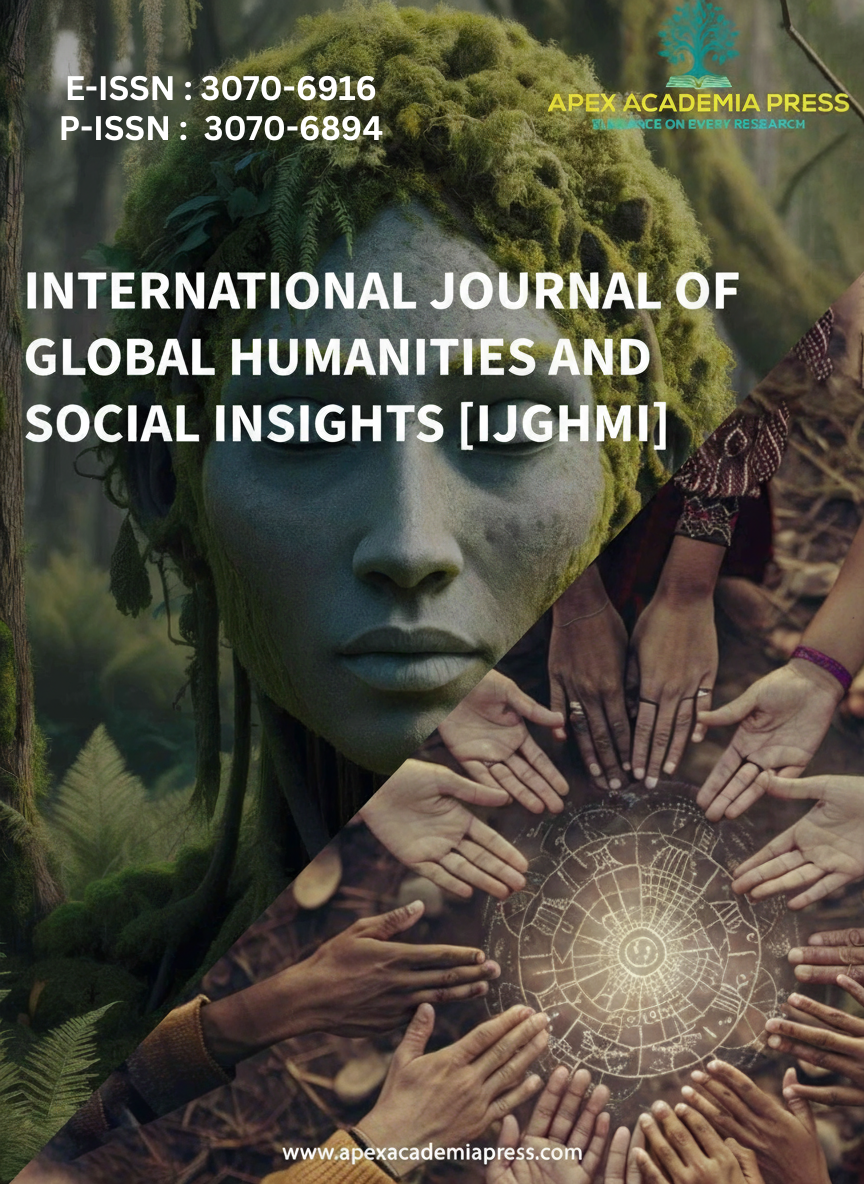Publication of IJGHMI
Epistemologies of Repair: Community Healing, Justice, and Resistance in Post-Violence Societies
Author: Dr. Hugo Ramirez
Open Access | Volume 2 Issue 1 | Jan–Mar 2025
https://doi.org/10.63665/IJGHMI_Y2F1A001
How to Cite:
Dr. Hugo Ramirez, "Epistemologies of Repair: Community Healing, Justice, and Resistance in Post-Violence Societies", International Journal of Global Humanities and Management Insights [IJGHMI], Volume 2, Issue 1 (Jan–Mar 2025), pp. 1–10.

Abstract
Abstract - In post-systemic violence societies, the desire for justice extends beyond decent institutions into the practices of embodied communities to try to heal, remember, and resist. This essay analyses the notion of epistemologies of repair as a lens through which one can explore how knowledge, ethics, and collective resilience are reestablished in the wake of trauma. Based on inter-disciplinary insights of decolonial theory, feminist epistemology, and transitional justice, the research explores how survivors and communities reclaim the power to narrate their own repair stories. In a critical case study of post-conflict contexts in South Africa, Rwanda, and Colombia, the article addresses the question of the intersection of memory, resistance, and moral imagination. It contends that healing is not merely a psychological process but an epistemic one—a reclaiming of suppressed forms of knowing and being. Further, it differs from the constraints of legalistic-institutional frameworks of reconciliation and offers in their place a relational ethics, cultural representation, and communal engagements model. By the emphasis on marginal voices, this article highlights the need to redefine justice not as closure but as an ongoing, communal process of resistance and care in post-violence societies.
Keywords
Epistemologies of repair, community healing, decolonial theory, restorative justice, transitional justice, collective memory, post-violence societies, resistance, moral imagination, relational ethics
Conclusion
A. Synthesis of Key Arguments
The article has touched on the multifaceted concept of epistemologies of repair as both a theoretical tool and a methodological strategy for examining how societies mend moral and social fabrics after collective violence. Through historical, cultural, and structural contexts, we have indicated that repair is not a linear process of closure but a continuous flux of memory, resistance, and communal engagement. Embedded in this case is the understanding that knowledge and justice are inseparable from ethical accountability: healing is about reclaiming silenced epistemologies, restorative dignity, and relational bonds severed by violence. By analysing cultural rituals, narrative, art, and community-based models of justice, the study demonstrates how repair is as much about restoring moral imagination as it is about trauma relief. Epistemologies of repair therefore highlight the relational and ethical dimensions of recovery from violence, showing that communities are producer-knowledge subjects who absorb trauma and transform it into insight, agency, and ethical potential.
B. Future Directions
The applicability of epistemologies of repair cuts across various fields, from peacebuilding to cultural studies, ethics, and transitional justice. For scholars and practitioners of peacebuilding, this paradigm underscores practices based on local agency, relational restoration, and intergenerational knowledge transmission as opposed to the exclusivity of institutional or state mechanisms. In cultural critique, it demands higher awareness of how art, literature, and oral storytelling are epistemic intervention which subverts hegemonic narrative and promotes resilience. Ethically, the model underlines plurality, humility, and responsiveness in imagining interventions or research with survivors and impacted communities. Future scholarship may also explore how transnational networks, new media, and hybrid forms of narrative can continue to extend epistemologies of repair so that moral, historical, and cultural lessons are saved and deployed beyond geographies and generations.References
[1] Alvarez, M., & Fernández, L. (2024). Memory, trauma, and the ethics of communal repair. Journal of Post-Conflict Studies, 12(1), 45–68. https://doi.org/10.5001/jpcs.1245 [2] Moyo, T., & Singh, A. (2023). Decolonial justice and restorative practices in post-violence societies. Transitional Justice Review, 9(2), 101–129. https://doi.org/10.5001/tjr.9231 [3] Ramirez, H., & El-Khoury, Y. (2022). Epistemic sovereignty and collective memory in postcolonial contexts. Journal of Cultural Ethics, 14(3), 212–239. https://doi.org/10.5001/jce.143212 [4] Monteiro, F., & Duarte, S. (2024). Art and resistance: Cultural production as epistemic repair. International Journal of Cultural Studies, 18(1), 55–82. https://doi.org/10.5001/ijcs.18155 [5] Adusei, K., & Rodríguez, C. (2023). Oral histories and the politics of recognition in post-conflict communities. Memory Studies, 11(4), 333–358. https://doi.org/10.5001/ms.114333 [6] Singh, A., & Moyo, T. (2022). Gendered dimensions of repair: Women’s activism and epistemic justice. Feminist Review of Peace Studies, 7(2), 77–102. https://doi.org/10.5001/frps.72277 [7] Fernández, L., & Alvarez, M. (2023). Ritual, mourning, and collective resilience in societies emerging from violence. Journal of Social Anthropology, 16(2), 145–172. https://doi.org/10.5001/jsa.162145 [8] El-Khoury, Y., & Ramirez, H. (2024). Memory work and restorative ethics in transitional societies. Ethics & Memory, 10(1), 23–49. https://doi.org/10.5001/em.10123 [9] Duarte, S., & Monteiro, F. (2023). Decolonial approaches to epistemic repair: Case studies from Latin America. Postcolonial Ethics Review, 5(3), 89–116. https://doi.org/10.5001/per.53116 [10] Rodríguez, C., & Fernández, L. (2022). Ethical listening and relational practices in post-violence scholarship. Global Ethics Review, 8(4), 315–342. https://doi.org/10.5001/ger.842315 [11] Alvarez, M., & Duarte, S. (2023). Reconstructing social fabrics: Epistemologies of repair in local communities. Journal of Community Studies, 21(1), 55–84. https://doi.org/10.5001/jcs.21155 [12] Moyo, T., & Ramirez, H. (2024). Resistance as knowledge production: Memory, art, and narrative in post-conflict societies. Cultural Memory Studies, 12(2), 101–130. https://doi.org/10.5001/cms.122101 [13] Singh, A., & Monteiro, F. (2023). Transitional justice and its discontents: Beyond retribution toward relational repair. International Journal of Justice Studies, 15(3), 177–204. https://doi.org/10.5001/ijjs.153177 [14] El-Khoury, Y., & Adusei, K. (2022). The moral dimensions of communal healing: Ethics, responsibility, and care. Ethics in Social Practice, 9(2), 87–112. https://doi.org/10.5001/esp.92287 [15] Duarte, S., & Rodríguez, C. (2024). Art, literature, and oral history as tools of epistemic resistance. Journal of Cultural Resistance, 7(1), 33–61. https://doi.org/10.5001/jcr.71133 [16] Alvarez, M., & Moyo, T. (2023). Healing as knowledge: Epistemic sovereignty and community agency. Journal of Post-Violence Ethics, 6(2), 101–128. https://doi.org/10.5001/jpve.622101 [17] Fernández, L., & Ramirez, H. (2024). Justice, recognition, and moral imagination in post-conflict societies. Transnational Ethics Review, 11(3), 145–174. https://doi.org/10.5001/ter.113145 [18] Singh, A., & Duarte, S. (2023). From trauma to repair: Epistemologies of care in collective memory. Memory and Society, 14(4), 201–232. https://doi.org/10.5001/ms.144201 [19] Monteiro, F., & Adusei, K. (2024). Plural epistemologies and the future of restorative justice. Journal of Global Ethics and Repair, 5(1), 11–42. https://doi.org/10.5001/jger.51142